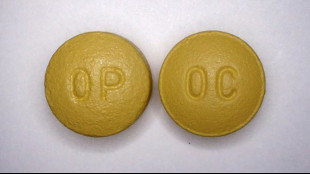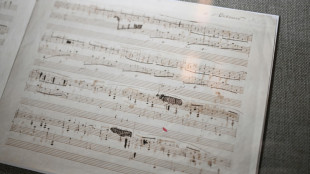
-
 US lawmakers advance forest management bill as fires scorch LA
US lawmakers advance forest management bill as fires scorch LA
-
Trump declassifies JFK, RFK, Martin Luther King Jr assassination files

-
 World champion Neuville holds slim lead in Monte Carlo Rally
World champion Neuville holds slim lead in Monte Carlo Rally
-
Indonesia, France to sign deal to transfer Frenchman on death row

-
 Gaza hostage families conflicted over those not on release list
Gaza hostage families conflicted over those not on release list
-
Rivals Bills and Chiefs clash again with Super Bowl on the line

-
 Ainslie no longer with INEOS Britannia after America's Cup defeat
Ainslie no longer with INEOS Britannia after America's Cup defeat
-
Between laughs and 'disaster', Trump divides Davos

-
 New Zealand star Wood signs new two-year deal with Nottingham Forest
New Zealand star Wood signs new two-year deal with Nottingham Forest
-
Son helps Spurs hold off Hoffenheim in Europa League

-
 Federal judge blocks Trump bid to restrict birthright citizenship
Federal judge blocks Trump bid to restrict birthright citizenship
-
Berlin gallery shows artworks evacuated from war-torn Ukraine

-
 'Evil' UK child stabbing spree killer jailed for life
'Evil' UK child stabbing spree killer jailed for life
-
Araujo extends Barcelona contract to 2031

-
 Hundreds of people protest ahead of Swiss Davos meeting
Hundreds of people protest ahead of Swiss Davos meeting
-
Saudi crown prince promises Trump $600 bn trade, investment boost

-
 English rugby boss vows to stay on despite pay row
English rugby boss vows to stay on despite pay row
-
US falling behind on wind power, think tank warns

-
 US news giant CNN eyes 200 job cuts, streaming overhaul
US news giant CNN eyes 200 job cuts, streaming overhaul
-
Sacklers, Purdue to pay $7.4 bn over opioid crisis: NY state

-
 Rubio chooses Central America for first trip amid Panama Canal pressure
Rubio chooses Central America for first trip amid Panama Canal pressure
-
Germany knife attack on children reignites pre-vote migrant debate

-
 AC Milan defender Emerson facing two-month injury layoff
AC Milan defender Emerson facing two-month injury layoff
-
'Shattered souls': tears as UK child killer sentenced to life

-
 China's Shenzhen to host Billie Jean King Cup Finals
China's Shenzhen to host Billie Jean King Cup Finals
-
Wall Street's AI-fuelled rally falters, oil slumps

-
 Trump tells Davos elites: produce in US or pay tariffs
Trump tells Davos elites: produce in US or pay tariffs
-
Progressive politics and nepo 'babies': five Oscar takeaways

-
 American Airlines shares fall on lackluster 2025 profit outlook
American Airlines shares fall on lackluster 2025 profit outlook
-
Sudan's army, paramilitaries trade blame over oil refinery attack

-
 France to introduce new sex education guidelines in schools
France to introduce new sex education guidelines in schools
-
'Brave' Keys deserves to be in Melbourne final, says Swiatek

-
 'Shattered souls': tears as horror of stabbing spree retold at UK court
'Shattered souls': tears as horror of stabbing spree retold at UK court
-
'Emilia Perez' lauded in Hollywood but criticized in Mexico

-
 Bayern's Davies ruled out 'for time being' with hamstring tear
Bayern's Davies ruled out 'for time being' with hamstring tear
-
Poland says purchased rare 'treasure' Chopin manuscript

-
 Calls for calm, Pope on AI, Milei on Musk: What happened at Davos Thursday
Calls for calm, Pope on AI, Milei on Musk: What happened at Davos Thursday
-
Ukraine orders children to evacuate from northeastern towns

-
 Hibatullah Akhundzada: Afghanistan's reclusive Taliban leader
Hibatullah Akhundzada: Afghanistan's reclusive Taliban leader
-
Argentina's record points scorer Sanchez retires from rugby

-
 Shiffrin set for World Cup skiing return at Courchevel
Shiffrin set for World Cup skiing return at Courchevel
-
'No conversation needed' for Farrell about Lions tour selection

-
 Wall Street's AI-fuelled rally falters
Wall Street's AI-fuelled rally falters
-
Drinking water in many French cities contaminated: study

-
 West Africa juntas tighten screws on foreign mining firms
West Africa juntas tighten screws on foreign mining firms
-
Spain govt to cover full cost of repairing flood-damaged buildings

-
 PSG loan France forward Kolo Muani to Juventus
PSG loan France forward Kolo Muani to Juventus
-
'Emilia Perez' tops Oscar nominations in fire-hit Hollywood

-
 Tears, gasps as UK court hears horrific details of stabbing spree
Tears, gasps as UK court hears horrific details of stabbing spree
-
St Andrews to host 2027 British Open


Ex-guerrilla Petro front runner in Colombia presidential primaries
Colombians voted for senator and former guerrilla Gustavo Petro as the left's presidential nominee by a wide margin on Sunday, making him the front runner in an election that could yield the country's first-ever leftist leader in May.
As predicted, the 61-year-old came out on top in the primaries -- called inter-party "consultations" -- which took place alongside elections for the Senate and House of Representatives, currently in the hands of right-wing parties.
But leftist candidates were projected to win the most seats in Colombia's Senate, as well as contending for second place in the lower house, partial results showed.
With more than 90 percent of polling stations counted, the left's Historical Pact coalition is set to win 17 of the 102 seats in the upper house, according to electoral authority figures.
In the lower house, it looks set to take 25 of the 165 seats in a tie with the Conservatives and behind the Liberals.
Nearly 39 million of Colombia's 50 million inhabitants were eligible to vote in a complex but critical election in a country plagued by violence and growing poverty levels.
"Colombia saw an election day with transparency and respect for rights," election authority head Alexander Vega said, referring to a largely incident-free vote.
- 'Rejection of violence' -
Outgoing President Ivan Duque -- who called on Colombians to vote as a "rejection of violence" through the "triumph of democracy" -- had promised safety "guarantees" for the non-compulsory vote.
The polls came with the president and legislature both at rock-bottom levels of public support.
Colombia has always been ruled by the political right. But polls show that Petro -- a former guerrilla, ex-Bogota mayor and senator -- stands a real chance of winning.
Centrist Ingrid Betancourt, who was once held hostage by the guerrillas of the now-defunct Revolutionary Armed Forces of Colombia (FARC), won her coalition's nomination Sunday. She presents herself as an alternative to both the ruling right and Petro.
Sunday's process is to yield three presidential contenders from 15 candidates hoping to represent groups of politically aligned parties -- one each for the left, right and center.
Three others have already been chosen by their respective groupings.
Six finalists will face off in a first round of presidential elections on May 29, which will be followed by a runoff on June 19 if no one wins an outright majority.
Petro came away with more than 80 percent of the vote for the Historical Pact coalition, winning against environmentalist Francia Marquez, who snagged 15 percent of the left's vote, to represent the group at the polls this spring.
- First leftist president? -
Voters flocked to the polls in Bogota, although heavy rains at midday threatened turnout.
"I vote to change this Congress, where it is always the same people who do nothing" for years, nurse Carolina Lopez, 30, told AFP.
Colombia's distrust of the left is widely associated with FARC and other rebel groups that fought the government in a nearly six-decade civil conflict.
"When the government is unpopular, there is alternation and the opposition wins, but in Colombia, this is new: the left has never really been in a position to win an election," said analyst Yann Basset of the Rosario University in Bogota.
In 2018, Petro lost the presidential race to Duque, who is leaving office as his country's most unpopular president in history following a year marked by social unrest and a violent police crackdown that drew international condemnation.
"Today, change starts at the polls, with a vote that supports hope and life in Colombia," Petro said while voting.
It is also Betancourt's second presidential run: she was abducted 20 years ago while campaigning and held captive in the jungle for more than six years.
Her vice presidential running mate is set to be retired colonel Jose Luis Esparza, who rescued Betancourt from her FARC captors.
Colombian presidents serve a non-renewable four-year term.
At midday, the government said there was "total normality" in voting throughout the country. But the army reported two soldiers had been killed and another two wounded in bomb attacks in southern Colombia.
The country's election authority confirmed an attempted cyberattack against its website before polling had begun, which they said was immediately controlled.
And Interior Minister Daniel Palacios said there had been 662 reports of incidents related to the vote, including 166 complaints, 120 cases of voter coercion and 120 cases of attempted bribery.
- Economy dominates -
Duque's successor faces a multitude of challenges, not least of which is a new cycle of murders and kidnappings as violence has surged despite the 2016 peace deal that disarmed the FARC and officially ended the civil war.
Fighters of the leftist National Liberation Army (ELN) still battle dissidents of the disbanded FARC, paramilitary forces and drug cartels for territory, resources and smuggling routes in Colombia, the world's largest cocaine exporter.
The new president will also have to contend with an economy hard hit by the fallout from the coronavirus pandemic.
E.Hall--AT
